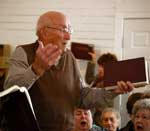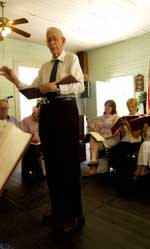About the Movie:
 "Awake,
My Soul" is a feature documentary that explores the history,
music, and traditions of Sacred Harp singing, the oldest
surviving American music. While often linked only to its
history, (e.g. the songs were used in the recent historical
films "Cold Mountain" and "Gangs of New York") this haunting
music has survived over 200 years tucked away from sight in
the rural deep south, where in old wooden country churches,
devoted singers break open The Sacred Harp, a shape note
hymnal first published in Georgia in 1844. These singers
have inherited The Sacred Harp and its traditions from those
who came before them and preserved these fierce yet
beautiful songs, many of which are much older than the
hymnal itself. And so they, like the early singers, begin
each song by intoning syllables which are represented by
each shaped note in their hymnal: fa, sol, la, and mi. To
the casual observer, it is some foreign, unintelligible
language, but to these Sacred Harp singers, it is the key
that unlocks mysteries: songs of both beauty and sorrow, of
life and of death, songs that cause feet to stomp and tears
to flow, often at the same time. They are ancient sounds,
which are at times disorienting to the modern ear, and yet
they are sung with such passion and force that it becomes
obvious that these songs are very much alive. Awake My Soul
is a film that captures both the history and the vitality of
a music that is utterly unlike any music most viewers are
likely to have heard. "Awake,
My Soul" is a feature documentary that explores the history,
music, and traditions of Sacred Harp singing, the oldest
surviving American music. While often linked only to its
history, (e.g. the songs were used in the recent historical
films "Cold Mountain" and "Gangs of New York") this haunting
music has survived over 200 years tucked away from sight in
the rural deep south, where in old wooden country churches,
devoted singers break open The Sacred Harp, a shape note
hymnal first published in Georgia in 1844. These singers
have inherited The Sacred Harp and its traditions from those
who came before them and preserved these fierce yet
beautiful songs, many of which are much older than the
hymnal itself. And so they, like the early singers, begin
each song by intoning syllables which are represented by
each shaped note in their hymnal: fa, sol, la, and mi. To
the casual observer, it is some foreign, unintelligible
language, but to these Sacred Harp singers, it is the key
that unlocks mysteries: songs of both beauty and sorrow, of
life and of death, songs that cause feet to stomp and tears
to flow, often at the same time. They are ancient sounds,
which are at times disorienting to the modern ear, and yet
they are sung with such passion and force that it becomes
obvious that these songs are very much alive. Awake My Soul
is a film that captures both the history and the vitality of
a music that is utterly unlike any music most viewers are
likely to have heard.
Insofar as Sacred Harp is among the earliest music in
America, its history is incredibly rich. The narrative that
emerges in this history is full of inspiring stories and of
conflict, mostly with the cultural elites. In this way, the
Sacred Harp tradition can be seen as being, on one hand
conservative, in that it has preserved these old songs, and
on the other hand, subversive, in that it has consistently
repelled any attempts to tame or change it by the cultural
and musical elites.

What is most moving about "Awake, My Soul", however, is the
singers themselves who wear their hearts on their sleeves
when it comes to the songs they sing. These singers are
surprisingly articulate, deeply thoughtful and often very
funny individuals who are passionate about Sacred Harp
singing. As Richard Delong puts it in the film, "We
scheduled life around Sacred Harp singing. We didn't
schedule Sacred Harp singing around life."

Over the course of 7 years, two Atlanta filmmakers, Erica
and Matt Hinton, have painstakingly amassed hundreds of
hours of traditional Sacred Harp singings in the southeast
as well as interviews with the most prominent traditional
Sacred Harp singers and composers.
 "Awake, My Soul" is a wonderfully detailed quilt made up of
historical material illustrated by rare archival images,
interviews with singers who share their often moving
personal histories, and the music itself, which is both
earthy and otherworldly at the same time. It once was lost
but now it's found: This is the story of the Sacred Harp.
"Awake, My Soul" is a wonderfully detailed quilt made up of
historical material illustrated by rare archival images,
interviews with singers who share their often moving
personal histories, and the music itself, which is both
earthy and otherworldly at the same time. It once was lost
but now it's found: This is the story of the Sacred Harp.
Producer/ Director's Statement
I discovered Sacred Harp singing in 1991. At a concert in
Atlanta, I heard about an upcoming "shaped note" singing
that was being held about in North Georgia. As I approached
the Primitive Baptist Church where the singing was held, I
could already hear voices. It was the sound, not of a choir,
but of people singing. People with flaws and without perfect
pitch, but meaning every word of it: "Serve with a single
heart and eye, and to Thy glory live or die." I immediately
felt transported. What can I call this experience?
Overwhelmed. There is a sense in which this moment informed
the entire making of ""Awake, My Soul"". It became my desire
for others to experience this moment as well. Ever
since, I have tried to convince my friends that if they will
only drive 45
 minutes,
their minds will be blown. Yet, 45 minutes is a tall order
evidently. I decided if they will not come to a singing, I
must bring the singing to them. And so, if no one else was
willing to step up and make a movie so I can blow my
friends' minds, I suppose we must do it. There are some who
claim that in documentary filmmaking, the filmmaker must be
an objective observer. If this is so, we are not documentary
filmmakers. My desire is to manipulate the emotions of the
viewer. I like to be manipulated. It's fun. (or, perhaps,
interesting) It is not exploitation: It is simply the
enjoyment of watching others, dumbfounded by this haunting
music, by those men in tears, by that boy studying the old
woman's hand. Film is, after all, a medium of communication.
The goal of our film is to communicate ideas, on one hand.
But on the other hand, we wanted to communicate a feeling. minutes,
their minds will be blown. Yet, 45 minutes is a tall order
evidently. I decided if they will not come to a singing, I
must bring the singing to them. And so, if no one else was
willing to step up and make a movie so I can blow my
friends' minds, I suppose we must do it. There are some who
claim that in documentary filmmaking, the filmmaker must be
an objective observer. If this is so, we are not documentary
filmmakers. My desire is to manipulate the emotions of the
viewer. I like to be manipulated. It's fun. (or, perhaps,
interesting) It is not exploitation: It is simply the
enjoyment of watching others, dumbfounded by this haunting
music, by those men in tears, by that boy studying the old
woman's hand. Film is, after all, a medium of communication.
The goal of our film is to communicate ideas, on one hand.
But on the other hand, we wanted to communicate a feeling.
As it happens, the ideas we wanted to communicate were
fascinating. The history and details of this rich tradition
could easily fill a 5 part series. After all, it is the
earliest American musical tradition extant. We had hundreds
of years of this story to draw from and as much as 200 hours
of footage. The embarrassment of riches that is inherent in
this musical tradition is not without problems, however. We
wanted to make the most accessible film possible, which
meant making difficult choices in order to keep it under 2
hours. Do we explore the various competing editions of the
book? Do we tell the story of the black Sacred Harp singers
of Alabama, or the northern singers who have picked up the
book? But these are subjects that deserve their own films,
rather than occupying a mere chapter in this one. We had to
kill our darlings, as they say.
In order to communicate the feeling, we simply had to
present the music and the singers as truthfully as we could-
without fast edits or a stylized look. And yet, it certainly
has a timeless feel: Well worn, like the music and singers.
- Matt Hinton |